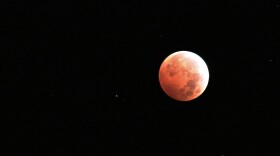-
AI-powered cameras are the newest thing in fire detection on Arizona’s Coconino National Forest. Some greet the technology with optimism. But others worry about the future of the HUMAN fire lookouts who have kept watch for decades.
-
A Coconino County resident died of a rare case of pneumonic plague earlier this month. Dave Wagner, director of Northern Arizona University’s Pathogen and Microbiome Institute, spoke about the life cycle of plague and his research team’s efforts to develop a vaccine.
-
A childhood story about the disappearance of a Costa Rican toad sent Trevor Ritland on a quest. The Flagstaff writer and documentary filmmaker tells the story in his new book, out today.
-
Scientists are using the Barringer Meteor Crater near Winslow to test equipment that might one day fly to the Moon.
-
Local agencies have a new tool to speed up wildfire response — AI-powered cameras. Arizona Public Service plans to install 30 by the end of June.
-
Work has begun on a long-awaited wildlife overpass on Interstate 17 south of Flagstaff. It’s the first of three intended for the area, which wildlife biologists say will dramatically reduce car crashes with elk and other animals.
-
The Trump administration cut funding and dismissed staff at the U.S. Global Change Research Program, which releases a Congressionally mandated assessment of climate change every few years. It’s unclear if the program will be revived in the summer legislative budget. Northern Arizona University climate scientist Ted Schuur spoke about the loss of American expertise.
-
The U.S. Bureau of Reclamation says Arizona will likely continue to take cuts in its Colorado River supply next year. The region’s historic drought shows no signs of easing.
-
National Park Service officials are working to eliminate a spawning ground for harmful nonnative fish in Glen Canyon.
-
"Wearable robots” might sound like science fiction, but a research lab at Northern Arizona University is perfecting an ankle exoskeleton to help people who have trouble walking.
-
Weather permitting, skywatchers in Arizona will be able to see a total lunar eclipse tonight — the first and only “blood moon” of the year.
-
A Senate committee will hold a hearing Thursday on the proposed Fix Our Forests Act, which is aimed at reducing catastrophic wildfires. However, support is mixed.
















